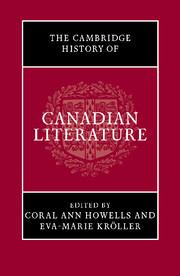Book contents
- Frontmatter
- Introduction
- PART ONE OLD AND NEW WORLD, LA NOUVELLE-FRANCE, THE CANADAS, DOMINION OF CANADA
- PART TWO THE POST-CONFEDERATION PERIOD
- PART THREE MODELS OF MODERNITY, POST-FIRST WORLD WAR
- PART FOUR AESTHETIC EXPERIMENTS, 1960 AND AFTER
- 18 Quartet: Atwood, Gallant, Munro, Shields
- 19 The short story
- 20 Canadian drama: performing communities
- 21 Poetry
- 22 Poetry, drama, and the postmodern novel
- 23 Comic art and bande dessinée: from the funnies to graphic novels
- 24 “Ghost stories”: fictions of history and myth
- 25 Indigenous writing: poetry and prose
- 26 Contemporary Aboriginal theater
- 27 Transcultural life-writing
- 28 Multiculturalism and globalization
- PART FIVE WRITING IN FRENCH
- Bibliography
- Index
- References
20 - Canadian drama: performing communities
from PART FOUR - AESTHETIC EXPERIMENTS, 1960 AND AFTER
Published online by Cambridge University Press: 28 September 2010
- Frontmatter
- Introduction
- PART ONE OLD AND NEW WORLD, LA NOUVELLE-FRANCE, THE CANADAS, DOMINION OF CANADA
- PART TWO THE POST-CONFEDERATION PERIOD
- PART THREE MODELS OF MODERNITY, POST-FIRST WORLD WAR
- PART FOUR AESTHETIC EXPERIMENTS, 1960 AND AFTER
- 18 Quartet: Atwood, Gallant, Munro, Shields
- 19 The short story
- 20 Canadian drama: performing communities
- 21 Poetry
- 22 Poetry, drama, and the postmodern novel
- 23 Comic art and bande dessinée: from the funnies to graphic novels
- 24 “Ghost stories”: fictions of history and myth
- 25 Indigenous writing: poetry and prose
- 26 Contemporary Aboriginal theater
- 27 Transcultural life-writing
- 28 Multiculturalism and globalization
- PART FIVE WRITING IN FRENCH
- Bibliography
- Index
- References
Summary
Canadian theater historiography
Theater, like historiography, is a process of analyzing and evaluating a society’s past and present. It articulates particular places and times to address private and public issues that may transcend these particularities, and helps to shape the society it reflects. Theater history can be read as voicing a national narrative or as countering a national narrative, as culturally validating or iconoclastic. In Canada, where a vast and diverse geographical and social landscape challenges imaginative configuration, theater has developed in diverse communities which resist the imposition of a cultural center. A persistent loyalty to local and regional place troubles the imperative to articulate a coherent national identity. Nor should Canadian theater be read in evolutionary terms, as a chronological development through clearly discernible phases. Its origins and forms speak to its collaborative, dynamic, amorphous, and performative nature.
Theatrical ritual and performance have existed in Canada long before colonization in the form of First Nations ceremony and dance. However, these Indigenous performances have been occluded by a long-standing historical assumption that the first performance was a Masque entitled Le Théâtre de Neptune en la Nouvelle France at Port Royal, Acadia (now Nova Scotia), written in 1606 by Parisian lawyer Marc Lescarbot, and enacted in barges and canoes by voyageurs dressed in Native regalia to celebrate the return of a French official from an exploratory sea voyage.
- Type
- Chapter
- Information
- The Cambridge History of Canadian Literature , pp. 402 - 421Publisher: Cambridge University PressPrint publication year: 2009



